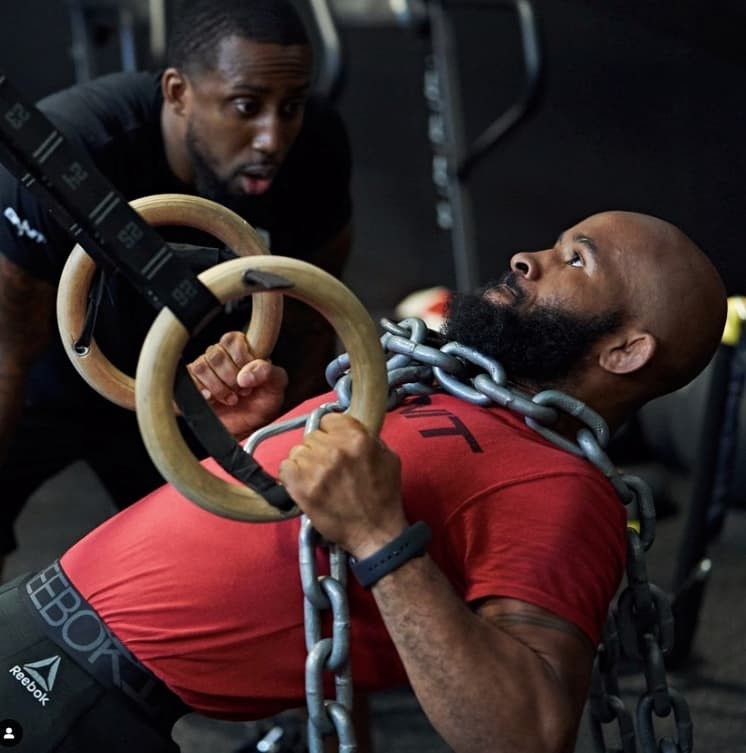Strength or skill

As you train jiu-jitsu, you will inevitably want to push yourself more and to get better and better. Even if you’re just there to learn self-defense and to stay healthy, you will almost certainly experience a moment when you are frustrated with some fault that you recognize in yourself. As a white belt, most of these faults will be a lack of training—you simply don’t know the techniques well enough. This may hinder your ability to perform them correctly or it may translate into an inability to defend against them.
As you progress, you’ll overcome these hurdles. You’ll learn to execute the moves better and you’ll be able to respond to an opponent’s offense more effectively and with greater efficiently. However, eventually you may find that you lack the strength or flexibility to perfect a technique, or you may feel as though your endurance is lacking. Again, this is natural part of the progression when you take up jiu-jitsu. It’s also the reason why so many people cross-train or supplement their jiu-jitsu training with weightlifting, endurance sports, or other martial arts.
There are numerous approaches to cross-training that you can take, and it’s worth listening to other fighters and to learn from their experience. In the below video, Lex Friedman talks about cross-training with three of the most well-known people in the world of jiu-jitsu, Georges St-Pierre, Gordon Ryan, and John Danaher, about cross-training and the tradeoff between strength and skill.
Georges St-Pierre on Cross-Training
In the above video, Georges St-Pierre says that he initially trained as if he wanted to be the next Jean-Claude Van Vamme or Arnold Schwarzenegger. He came of age in the 90s, and fighters were expected to be extremely cut. This meant lifting a lot.
Over time, Georges noticed that there were other fighters who were not in the weight room five or six days a week, and they were still capable of dominating on the mat. He realized that being able to bench press three plates (315 lbs) or squat five plates (495 lbs) wasn’t going to make him a better fighter. It wasn’t going to make him a more efficient fighter, which should always be your primary goal. At this point, Georges refocused his attention on technique and on cross-training to improve his endurance, and now says that he thinks of cross-training as a form of therapy, as a way to keep both his mind and his body healthy.
Gordon Ryan on Cross-Training
Gordon has a slightly different approach. He still does a lot of bodybuilding workouts and believes that they can provide a good supplement to jiu-jitsu training. For him, this means training jiu-jitsu every day and weightlifting perhaps three or four times per week. Typically, he doesn’t put too much stress on his body when he lifts and prefers to use moderate weights with a high rep count to improve his endurance. This usually translates into four sets of 20 with one drop set. This changes when he is preparing for a major fight, as he will usually redline himself in the weight room to prepare for the extreme level of stress the fight will likely put on his body.
As he says in the video, being stronger is always going to help in a fight or a competition, but he does stress that it’s not going to override efficiency unless you find yourself in a very unique situation (say, doing hand-to-hand combat with a silverback gorilla). “There’s only so much technique that can overcome a certain kind of strength.”
John Danaher on Cross-Training
John Danaher takes a more nuanced approach. For him, strong fighters need to have a well-developed jiu-jitsu skillset and the attributes that make a good athlete (speed, endurance, balance, strength, etc.). The real question then isn’t if it’s a good idea to increase your strength or become more flexible, it’s a question of if it makes sense to develop these attributes and consequently sacrifice time and resources that could be spent on improving skill.

In other words, everyone can agree that being stronger or more flexible or faster is useful in a combat situation, but it becomes controversial if it means you would you have to sacrifice skill in order to achieve those results. Is it worth it?
For John, he believes that investing in strength training is worthwhile. When you get on the mat with someone who was struggling to bench press a single plate (135 lbs), but now can easily put up more than 200 lbs, you notice the difference. But what about a person who can bench three plates compared to a person who can bench four? That is 90 pounds. It’s a certainly a major difference in the world of weightlifting, and it takes a lot of time, effort, and dedication to get to be able to put up that kind of weight. When you’re on the mat rolling with this person, though, can you tell the difference?
John believes this thought experiment gives you a simple answer, which is no. Once you get to a certain strength level, going above and beyond will have diminishing returns when it comes to the practice of jiu-jitsu. More importantly, if you put that amount of energy into increasing strength, it necessarily means that you are taking time away from perfecting technique. For John, this is a mistake. There is no question that improving your skill is more important.
Reaching the Limit
Toward the end of the interview, John asks, “At what point do you start to say, ‘I’m not going to be helped by further increases in strength training or endurance training.’” For him, the answer is simple: If there’s every any doubt, invest your time in developing technique.

